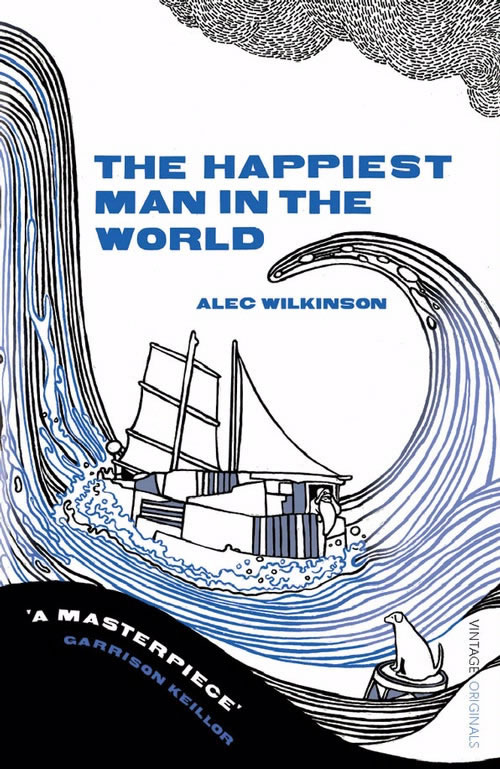“David Pearlman was fifty when he was bit on the hand by a dog, in Mexico. For two years he was so sick that he assumed he would die. When he recovered, he felt so different from who he had been that he thought he should have a new name. He began calling himself by the first one that came to him: Poppa Neutrino.”
 And now he’s seventy-one, sitting under a pine tree in Flagstaff, Arizona, thinking up an American football play that will revolutionise his fortunes, which need revolutionising because Poppa Neutrino hasn’t a bean, despite having sailed across the Atlantic on a raft built from scrap without making nearly as much fuss as Thor Heyerdahl, whose Kon-Tiki expedition inspired Neutrino. Or didn’t, really, because Poppa Neutrino is inspired. There is something of the breath of God in Neutrino, or something about him from which you could perhaps deduce the notion of the breath of God, even though Alec Wilkinson’s prose is marvellously spare and precise – makes Raymond Carver look like a man who over-writes – and you wonder how someone who can write so sparely and precisely could invent someone like Poppa Neutrino, a life-force, a devil-may-care, a man with a crazed but serviceable philosophy based upon an almost inarticulable trifecta, someone who has plans, infinite patience, the charm to live without money, the hardiness to endure such a life, endless invention, irresistible rhetoric.
And now he’s seventy-one, sitting under a pine tree in Flagstaff, Arizona, thinking up an American football play that will revolutionise his fortunes, which need revolutionising because Poppa Neutrino hasn’t a bean, despite having sailed across the Atlantic on a raft built from scrap without making nearly as much fuss as Thor Heyerdahl, whose Kon-Tiki expedition inspired Neutrino. Or didn’t, really, because Poppa Neutrino is inspired. There is something of the breath of God in Neutrino, or something about him from which you could perhaps deduce the notion of the breath of God, even though Alec Wilkinson’s prose is marvellously spare and precise – makes Raymond Carver look like a man who over-writes – and you wonder how someone who can write so sparely and precisely could invent someone like Poppa Neutrino, a life-force, a devil-may-care, a man with a crazed but serviceable philosophy based upon an almost inarticulable trifecta, someone who has plans, infinite patience, the charm to live without money, the hardiness to endure such a life, endless invention, irresistible rhetoric.
And then a thought struck me. Could this stuff be true? Could Wilkinson be writing about a real person called Poppa Neutrino, who really did live in a box in Manhattan and build a raft from scraps and defeat an octopus in a storm and invent a revolutionary football play and douse himself in perfume when he couldn’t bathe and make money singing to tourists on the waterfront and build another raft to sail around the world and set up the Salvation Navy in opposition to the Salvation Army but disband it when all the crackhead hangers-on burned down the meeting room? “He was wearing a dark shirt and a pair of dark nylon shorts over his dark trousers. I said I had never seen that look before. He said his zipper was broken. Then he asked if I thought it looked strange, and I said it looked fine and, oddly, on him, it did.” Could The Happiest Man in the World be non-fiction?
An easy point to miss. Nothing on the uncorrected proof copy to suggest Poppa Neutrino is real. The cover blurb – “Alec Wilkinson’s most charming subject yet: eccentric hero Poppa Neutrino” – doesn’t give us a clue. And what is interesting, perhaps, is despite all the clues – the eccentric but exhaustive genealogy of Neutrino, the tension between style and content, the precision of detail – one’s first instinct is to classify the book in one’s mind as fiction. A novel. Only fiction can tell the stories of people like this.
And the underlying beliefs that lead to such a (wrong) conclusion are interesting. That recounted lives are dull or conventionally heroic or driven by some quantifiable desired outcome (to prove this, to make that amount of money, to defeat these enemies) and that what are quite possibly crazed yet wholly sane lives must go untold. To assume that non-fiction wouldn’t touch Neutrino, or, worse, that the world couldn’t come up with Neutrino, is a Spartish indictment of non-fiction, of the world.
But here he is. He’s real. He is worthier of our reading than any worthy and Wilkinson has created a magical artefact out of Neutrino’s life. In reality, neutrinos are passing through our bodies continually, unnoticed, and the metaphor holds good. In the second half of the book, Wilkinson’s detachment fails him, though his style remains pure. Nor can the reader remain detached. I terribly want to know what becomes of Neutrino. Has the football play worked? Has he got back to Mexico? Has he set off on his mad raft, alone, just as we are all on our mad rafts, alone?

